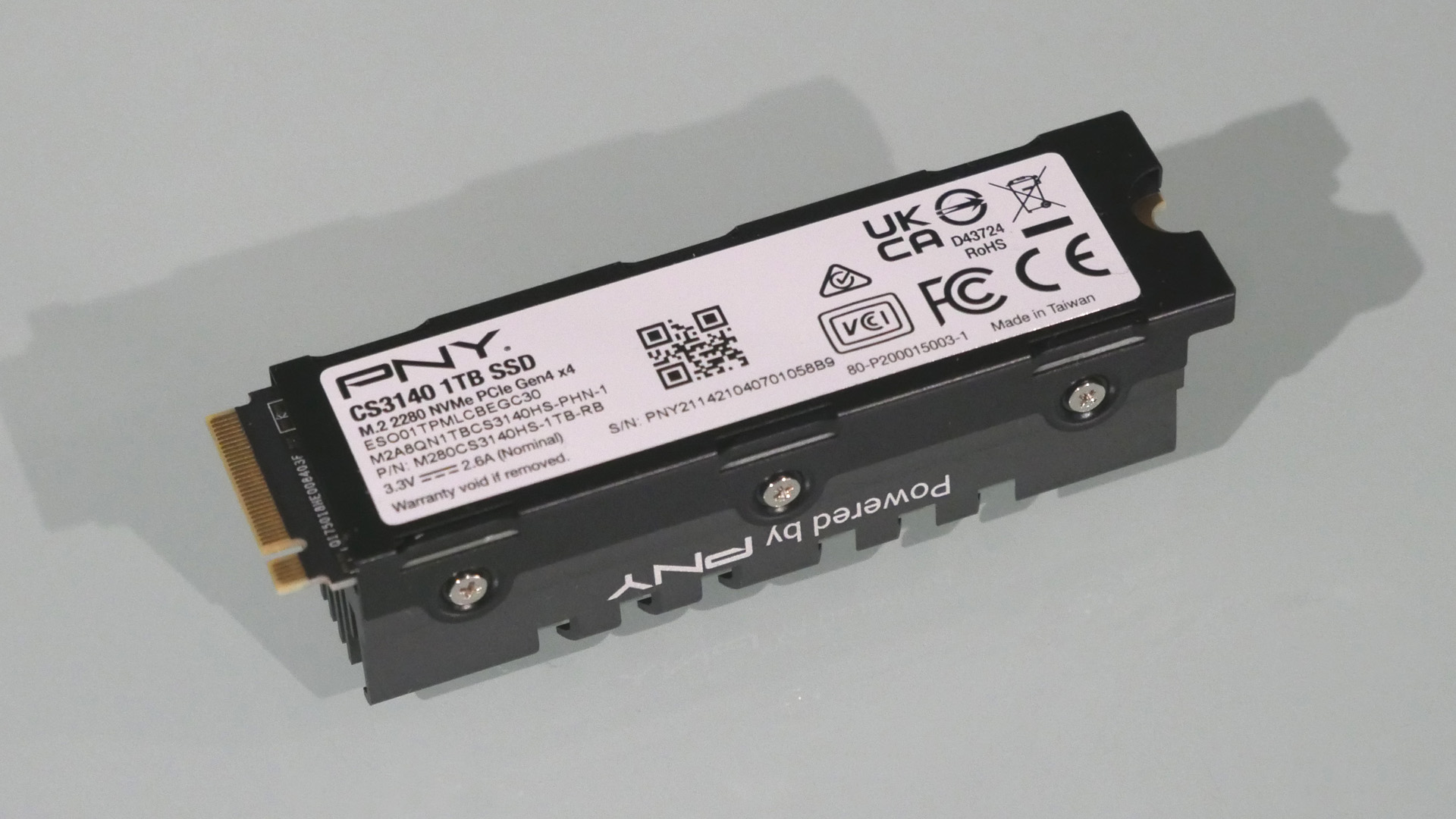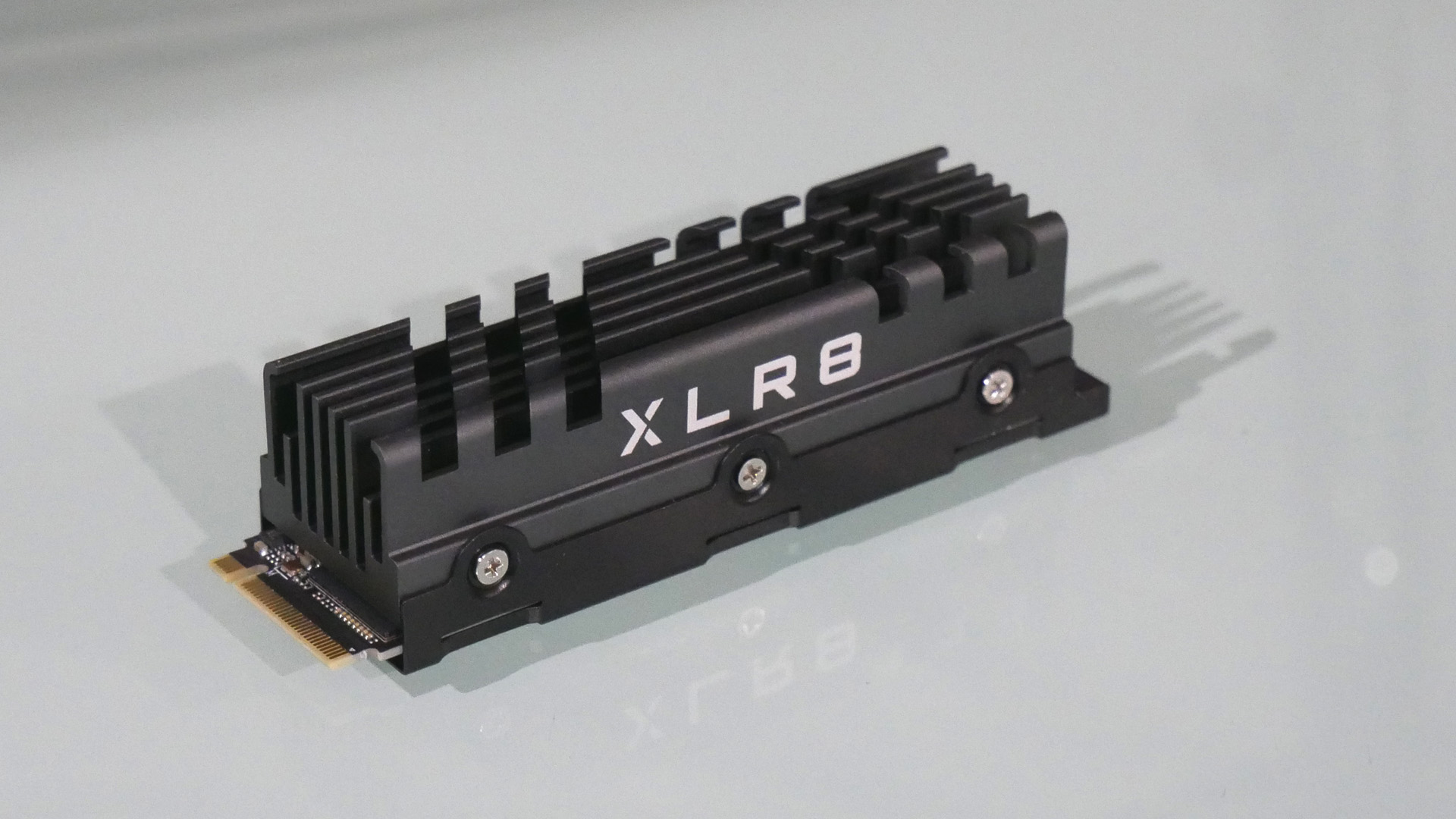GamesRadar+ Verdict
A speedy but slightly spendy PCIe Gen 4 SSD.
Pros
- +
Good overall performance
- +
Runs nice and cool
- +
Five-year warranty
Cons
- -
Slightly disappointing 4K throughput
- -
Pretty pricey
- -
Big heatsink limits compatibility
Why you can trust GamesRadar+
Quad-lane PCIe Gen 4 interface, read speeds up to 7,500MB/s, proper TLC flash memory not that cheapo QLC stuff, and a big, fat heat sink. Yup, the PNY XLR8 CS3140 1TB SSD has plenty going for it and much of that aligns it with those on the internet's best SSD for gaming lists.
On paper, it’s one of the fastest of the current generation of PCIe Generation 4 drives. Yes, yes, Gen 5 SSDs are incoming and will support up to twice the bandwidth. But it’s going to take years before both drives and the Gen 5-compatible platforms required to run them, including games consoles as well as the best gaming PCs and the best gaming laptops, become widely available. For now, then, the likes of the PNY XLR8 CS3140 1TB are about as good as it gets, by the specs at least.
Design & Features
Speaking of specs, PNY isn’t exactly expansive when it comes to the details. The drive comes with a healthy five-year warranty, but PNY doesn’t get into the specifics regarding write endurance or the identity of the controller chipset used.
Not that PNY has anything to hide. Turns out this drive packs the popular Phison PS5018-E18 controller, plus four 256GB packages of Micron 96-Layer 3D TLC NAND and 1GB of DDR4 cache memory. It’s quality stuff, especially that Phison controller. It’s an eight-channel chip with five cores, two of Phison’s own design, and good for no fewer than one million IOPS.
As for the CS3140’s physical bearing, the basics involve a conventional M.2 2280 SSD. But it’s optionally available and reviewed here with a very beefy heat sink. The benefits of that kind of cooling on an SSD vary, but it doesn’t add a lot of cost and could help with both immediate performance and long-term reliability.
That said, it’s a very large heat sink, taking the overall thickness of the drive to over 20mm and nearly double the maximum supported by the Sony PS5. Indeed, it’s fat enough that we’d recommend PC users check it doesn’t foul other components on their motherboards.
You can get the CS3140 without the heatsink and PNY also sells a PS5 SSD version with a heatsink too. Obviously, this drive is a non-starter for those looking for Xbox Series X hard drives.

Performance
Along with that headline read speed, PNY says this 1TB model is good for 5,650MB/s writes (the larger 2TB model clocks in at 6,850MB/s). In our testing, it doesn’t quite achieve those claimed highs, topping out at just over 7,000MB/s reads and around 5,200MB/s writes in CrystalDiskMark 7. In other synthetic measures of peak performance, you’ll see a similar picture - good performance, but a little short of the claims.
Still, that puts it up there and on par with the very fastest 1TB Gen 4 drives we’ve seen, including the WD SN850 and Samsung 980 Pro. The new Kingston Fury Renegade is a little quicker for reads, at 7,350MB/s. But we’re splitting hairs. When it comes to peak sequential performance, this thing flies. We’re talking about many gigabytes of performance in both directions.
It’s a little less impressive when it comes to 4K random access performance. By way of example, the WD SN850 cranks out 316MB/s at queue depth one and the Sabrent Rocket 4 Plus is good for 285MB/s. The XLR8? It manages 251MB/s.
But what of sustained performance? In our pre-test drive fill procedure using an internal file copy process, the XLR8’s performance drops off dramatically after around 300GB/s. Virtually all drives exhibit performance drop-offs at some point and, generally, there are two reasons for that - overheating and running out of SLC cache.
The XLR8 runs at a remarkably cool 36 degrees C even under load, no doubt aided by that big heat sink. So, the 300GB limitation almost certainly reflects the proportions of the 1TB capacity that’s allocated to operate in faster SLC mode rather than any thermal throttling. Either way, 300GB of unfettered performance should be plenty for most users.

Overall - should you buy it?
The PNY XLR8 CS3140 1TB is a speedy top-performing SSD based on well-proven technology in the Phison controller and Micron flash memory, all backed by a five-year warranty. It also runs nice and cool, which bodes well for long-term reliability.
Of course, the hefty heat sink may limit physical compatibility with some PC configurations and also means it’s not an option for consoles. But if there’s a real deal-breaker, it’s pricing. The CS3140 is admittedly pitched at a similar point in the market to other PCIe Gen 4 drives based on the Phison E18 controller. However, some very good Gen 4 drives based on alternative technology, including the WD SN850, can be had for as much as 20 percent less money. That’s hard to ignore.
And if your search is more for something externally-shaped then check out our guides to the best external hard drives, best PS5 external hard drives, and best Xbox Series X external hard drives to cover your bases.
A serious dissertation on the finer points of input lag and overshoot followed by a forensic examination of AI-accelerated temporal upscaling. Such is a routine day in the working life of long-time tech wordsmith, Jeremy Laird. Along with GamesRadar, Jeremy’s 15-year back catalogue includes a host of tech and gaming outlets, including TechRadar and PC Gamer, not to mention contributions to mainstream media from the Independent to the Evening Standard. Complimenting Jeremy’s debilitating addiction to all kinds of digital hardware, he is also afflicted by an obsession with and a significant occupational sideline in cars and automotive technology.





